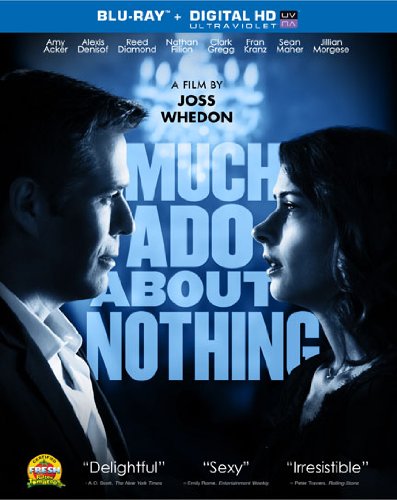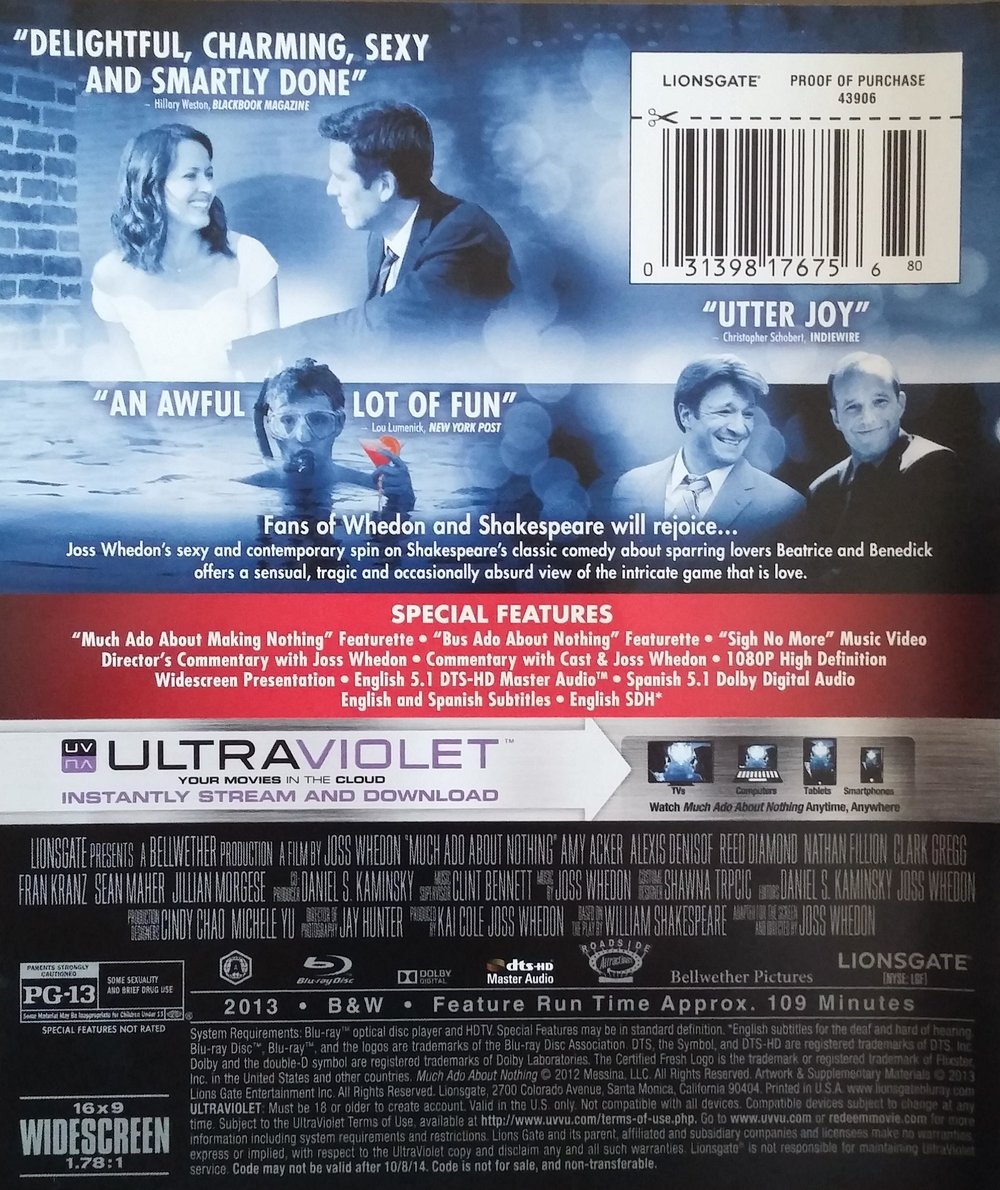

Shakespeare Much Ado About Nothing film. Adapted for the screen and directed by Joss Whedon. Stars Amy Acker (Beatrice), Alexis Denisof (Benedick), Jillian Morgese (Hero), Fran Kranz (Claudio), Reed Diamond (Don Pedro), Clark Gregg (Leonato), Sean Maher (Don John), Spencer Treat Clark (Borachio), Riki Lindhome (Conrade), Nathan Fillion (Dogberry), Ashley Johnson (Margaret), Emma Bates (Ursula), Tom Lenk (Verges), Nick Kocher (First Watchman), Brian McElhaney (Second Watchman), Joshua Zar (Leonato’s Aide), Paul M. Meston (Friar Francis), Romy Rosemont (The Sexton), and Elsa Guillet-Chapuis (mute role as Court Photographer). Music by Joss Whedon; cinematography by Jay Hunter; edited by Daniel Kaminsky and Joss Whedon; produced by Joss Whedon and Kai Cole. Released 2013, disc has 5.1 dts-HD Master Audio sound. Grade: A
This is a delightful film version of Much Ado that follows the plot well with maybe 40% of the original text trimmed. Has English subtitles. The text that's left still makes you work. But the visual telling of the love stories carries you along even before you master the text. The whole film was made almost as a lark on a shoestring budget (more later on that). Whedon also published a book about the film which has the complete screenplay:
For once, you get a bargain. I bought the HDVD from an Amazon third party vendor for about $6 and the book for about $3. So with shipping this came to about $15 total.
Below we find Leonato, Governor of Messina (Clark Gregg) with his daughter Hero (Jillian Morgese) and his niece Beatrice (Amy Acker). They are discussing the return from the wars of Benedick, a young Lord with whom Beatrice has an ongoing "merry war" of wits. Beatrice asks:
The august Atlantic magazine doesn't follow movie and TV stars much. But here's what Terrence Rafferty had to say in the July/August 2015 issue of Atlantic (page 99 or so): "Maybe the most spectacular recent example of a young American . . . tackling a classical part is Amy Acker's radiant Beatrice in Much Ado about Nothing, Joss Whedon's nimble, and very faithful, 2012 movie. . . . she's at least as formidable a Beatrice as Emma Thompson was in Branagh's 1993 Much Ado, and Acker is, I think, more touching and finally more believable."
Next below is Claudio (Fran Kranz), another returning soldier. He meets Hero and it's love at first sight:
Now we meet dour Benedick (Alexis Denisof) shoring up his defenses against Beatrice:
Glittering entertainment:
Meet Elsa Guillet-Chapuis, the Court Photographer. She kept getting in the rushes by accident, so Whedon, in total control, fixed that by making her part of the cast:
The friends conspire to trick Beatrice and Benedick into falling in love. The trick requires action on two fronts. Here's Front 1: Claudio, Don Pedro (Reed Diamond), and Leonato discuss (while they know Benedick is listening) how obvious it is that Beatrice loves Benedick:
Which starts to break through Benedick's defenses:
Front 2: Gentlewoman Ursala (Emma Bates) and Hero discuss (while they know Beatrice is listening) how obvious it is that Benedick loves Beatrice:
But while Beatrice and Benedick are secretly falling in love, dastardly deeds are afoot. Don John (Sean Maher), a bastard brother of Don Pedro, is also visiting. Resentful of his legitimate relatives and friends, he sets out to ruin some lives. He warns Claudio and Don Pedro that Hero is not the nice girl she seems to be:
Don John arranges for his follower Borachio to make love to a servant in Hero's bedroom while Claudio looks on (at night thru a window) and mistakenly believes that he is seeing Hero's form. This leads to a terrible scene on the wedding day when Claudio publicly rejects Hero:
Hero and Beatrice are equally astonished at this sudden and cruel turn of events:
The family is advised by the kindly Friar Francis (Paul M. Meston) to pretend that Hero has died from shock. This will buy them time to try to clear Hero's reputation:
The shocking assault on Hero causes Benedick and Beatrice to acknowledge their love:
Night watchmen overhear Borachio (Spencer Treat Clark) bragging about his crime with the maid in Hero's bedroom, and Borachio is apprehended:
Thank goodness the Chief of Police (Dogberry, played by Nathan Fillion) is alert, efficient, and well-versed in the law:
Hero comes back to life in a surprising way:
And this being Shakespeare, there has to be yet another elaborate subplot involving Beatrice, Benedick, and mysterious writings—and then they can join Hero and Claudio at the marriage altar:
For years, Whedon had hosted Sunday parties in his home for drinking, eating, and reciting Shakespeare. As he accumulated ever more great actors in his own informal repertory company, the idea emerged to shoot Much Ado for fun. 12 days fell open on the calendar and were scheduled. Whedon's wife Kai donated their house for the set (which she had designed as architect perhaps with Much Ado subconsciously in mind). Per Whedon, the budget was the "least amount of money that there has ever been." Black and white film avoiding all manner of color issues. When a neighbor starting demolishing his house, Kai somehow got the workers to stop while actual filming was done. The cops raided one day thinking there was a porn shoot underway—they were satisfied when everyone agreed to park fewer cars. Everyone involved threw all the energy they had into this. The print movies critics were ecstatic, and the film has achieved cult status. And this was the only Shakespeare Whedon had ever directed.
To date, all the plays published in HDVD have been Shakespeare. We have quite a few wonderful full productions from The Royal Shakespeare Company and The Globe, both in England. We also have several Shakespeare-based movies that are more problematical. Some of these movies have perhaps as little as 10 to 20 precent of the original text. Are these movies fine-art or merely exploitation? Where should we draw the live in reporting such movies or our website? Perhaps the line should be this: if the movie teaches the viewer enough about a Shakespreare play to help the viewer to enjoy the full text, then we should cover it. Learning to read any Shakespeare play requires a big effort. Any shorter version has valid fine-art value if it provides a good stepping stone to the full play. Whedon's Much Ado certainly passes that test, and it is apparently being used this way in high schools throughout the US.

















